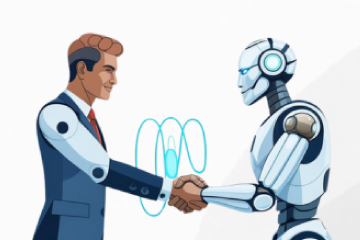Steven Van Belleghem: The Core Message of ‘The Offer You Can’t Refuse’
VOICE OF EXPERTS
The Core Message of ‘The Offer You Can’t Refuse’

A few weeks ago my fifth management book, The Offer You Can’t Refuse, was released. It is positive story about the future of customer experience. As you know it is my passion to share stories about the future of customer experience. This new book is based on the insights I gathered in the last 24 months by talking to hundreds of companies all over the world. I really hope the new insights and conclusions will motivate you to ignite positive change in your organizations. In this artice I am happy to share the core message of ‘the offer you can’t refuse’ in this article. Please let me know what you think.
Social challenges
Society is looking increasingly towards companies to help tackle society’s problems. People’s trust in the companies is greater than their trust in the government, as revealed by an annual study by the American PR and marketing advice bureau Edelman.1
Companies like Unilever, Danone, Salesforce, Nestlé and many others now have very clear climate objectives, which are in keeping with the societal ambition to limit the effects of global warming2. Jeff Bezos, the CEO of Amazon, decided in February 2020 to invest 10 billion dollars in a fund to combat climate change. This money will be used to support scientists and activists in their efforts to protect our environment.
It is evident that both awareness of and actions to deal with climate change are moving into overdrive. But in spite of all this hopeful news, as few as 25 per cent of companies have a climate plan that is worth the name3. The opportunities for society to grow further in this direction are still enormous.
More than ever before, people are starting to worry almost daily about the challenges facing society. The climate problem is just one of the major concerns of the average citizen. Health care is, of course, another issue that is fairly close to the top the list.
As a result of the unexpected outbreak of the coronavirus, we have all been forced to face up to our weakness. Humanity is vulnerable and it will only be thanks to a previously unseen degree of co-operation between the public, the business community, scientists and politicians that we will eventually be able to defeat this terrible contagion. From now on, every company will need to be active in some way in health care. That is a matter of concern to us all.
In the years ahead, the expectations of customers will also be increasingly coloured by such societal concerns. More and more consumers will be looking for companies that take their social responsibilities seriously.
The biggest digital transformation ever
At the same time, it needs to be recognised that customer expectations are not focused exclusively on societal problems. For most consumers, their personal challenges, dreams, fears and desires are still at the forefront of their minds. Benefiting society alone without meeting the basic expectations of customers (in terms of price, product and service) is a non-starter. Companies therefore face the task of making sure that they can also satisfy the personal challenges of their customers – if they want to keep them.
In 2020, we all took part in the largest digital trainings course ever. Everyone – young, old, rich, poor, pro or contra – had no other choice during the great lockdown than to embrace the use of digital tools. Not only to work, communicate and relax, but also to buy products. There was simply no other option than the digital option.
Consumers threw themselves wholeheartedly into the digital process, resulting in a rapid learning curve and a previously unexperienced peak of use. The chief technology officer of Shopify, the largest e-commerce platform for traders and companies, said at the end of April 2020: ‘The number of daily purchases via the web is now comparable with the total number of purchases on Black Friday4.’ Black Friday and Cyber Monday are the busiest online shopping days of the year in the United States. Those annual top-spots have now suddenly become the daily average.
For many companies, this need to switch rapidly to digital represented the largest transformation exercise they had ever faced. Many of them were simply not ready with the measures and procedures that would allow their employees to work from home, forcing them to improvise solutions at very short notice. Likewise, many of them had no readily available e-commerce option, so that they needed to develop something almost overnight. Satya Nadella, the CEO of Microsoft, has commented: ‘The digital transformation in March and April was on a larger scale than the digital transformation we have witnessed during the past two years5.’
This digital sprint has resulted in the disappearance of many digital barriers, both for customers and for companies. And those barriers will never be coming back. From now on, digital will more than ever be part of every aspect of our daily lives. If, as a company leader, you look out of your office window, you can only see a very small piece of the world. But the invisible digital segment of that world is getting bigger and more important all the time.
When formulating the customer strategies of the future, it is crucial to ensure first and foremost that the digital components are 100 per cent in order. Customers now know which digital interfaces work well and which ones do not. The quality level of digital services has improved dramatically in recent years, so that this standard of excellence is now regarded as a minimum requirement. It is fast becoming the newest commodity.
The start of new customer expectations
Between 2010 and 2020 a new type of customer relationship came into being, based on the increasing ease of use of digital applications. Companies like Uber, Amazon, Zalando, WeChat, DiDi, Booking.com and many other digital enterprises responded perfectly to these changing expectations, allowing some of them to develop into the largest companies in the world. The underlying technologies that made this possible were 4G, mobile devices and social media. In the meantime, the curve of customer expectations based on these technologies has reached its ceiling. However, in the years ahead we will see the development of a new curve with yet another set of new customer expectations.
In my new book I will describe how you, as a company, can deal with and make best use of these new customer expectations, which are gradually becoming more and more visible. Today, we are only at the very bottom of the curve, but it is my hypothesis that by 2025 many of the elements explained in my new book will have become the most normal thing in the world.
The new customer expectations are influenced by three elements:
- General purpose technology: the coming decade will see the growth of technologies such as 5G, artificial intelligence, quantum computing and robotics. Each of these technologies has the potential to change whole industries. But the combination of the four technologies together is set to revolutionise the way we live and work. The technologies will also offer new possibilities to take customer relations to a higher level.
- Personal challenges: everyone has their own personal dreams, fears, wishes and ambitions. As digital ease of use becomes the new norm, the question for companies will be how they can make the difference by responding successfully to the more emotional aspects of their customers’ lives. Digital ease of use will guarantee transactional convenience. The next step is to provide greater ease and convenience for customers’ emotional expectations.
Societal challenges: more and more people are asking questions about the future of society. Challenges relating to technology, health and the climate are now at the top of many people’s agendas. As a company, you can make use of your strengths to create a positive added value for the community.
The Offer You Can’t Refuse
If your company knows how to respond cleverly to the emergence of these three drivers, you will have the opportunity to develop a stronger relationship with your customers. In my new book, I would like to take you on a journey; a journey that will help you to create that new kind of customer relationship. Based on a clear strategic vision, numerous practical examples and plenty of useful tips, I want to make it possible for your customers to receive an Offer They Can’t Refuse in the very near future.
You can develop The Offer You Can’t Refuse by investing in the following three axes, which will allow you to react in an appropriate manner to the new generation of customer expectations:
- Ultimate Convenience: this is the use of new technology in a smart way to make interfaces ever more automated, so that the customer needs to make no effort to do business with your company. This leads to the perfect transactional relationship.
- Partner in Life: this is not about your customer journey, but about the life journey of your customer. Which aspects in the lives of your customers create negative or positive energy? What things cost them too much effort? If you can provide answers to these questions, you can optimise your emotional relationship with your customers.
- Save the World: this is about companies taking their responsibility to do good for society as a whole. Every company has strengths that it can use to create a societal added value. Search for concrete solutions and contributions that will allow your company to make a truly tangible impact.
Hopefully this introduction gave you a good overview of what to expect from my new book. Feel free to share your thoughts.
1 https://www.edelman.com/trustbarometer
2 https://sciencebasedtargets.org/2019/09/22/87-major-companies-lead-the-way-towards-a-1-5c-future-at-un-climate-action-summit
3 https://www.fastcompany.com/90459443/what-will-it-take-for-the-75-of-companies-that-dont-have-climate-commitments-to-step-up
4 https://www.bnnbloomberg.ca/shopify-surges-after-cto-touts-black-friday-level-traffic-1.1423058
5 https://www.microsoft.com/en-us/microsoft-365/blog/2020/04/30/2-years-digital-transformation-2-months
Steven believes in a bright future where companies play the long-term game with their customers. His passion is spreading ideas about the future of customer experience. Steven believes in the combination of common sense, new technologies, an empathic human touch, playing the long-term game and taking your social responsibility to win the hearts and business of customers over and over again. Steven is the author of multiple international bestselling books including ‘The Conversation Manager’, ‘When Digital Becomes Human’, ‘Customers the Day after Tomorrow’, ‘The Offer You Can’t Refuse’.

